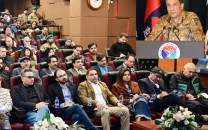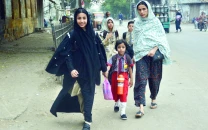General Sharif’s welcome speech
The army chief has voiced the military’s readiness to jump into action against TTP should the dialogue process fail.

The army chief has voiced the military’s readiness to jump into action against TTP should the dialogue process fail. PHOTO: ISPR
Tehreek-e-Taliban Pakistan (TTP). There have long been apprehensions that the military was not on board the government-pushed peace initiative involving talks with the TTP, and that the civilians were under pressure to wrap up the process and move on to open warfare with the militant groups. In fact, most had it that the General Headquarters’ opposition to the dialogue had resulted in tensions between civilian and military leaders. However, the army chief’s comments should put to rest such apprehensions.

General Sharif was pretty unequivocal in stating that this was not the case when he said “the Pakistan Army supports any endeavour for the elimination of terrorism and the establishment of peace”. Needless to say, there could be, and perhaps even should be, differences of opinion in how to deal with the menace of terrorism. Indeed, every war cabinet has such differences in advice and strategy, but this does not necessarily translate into acrimony, as is being speculated. And it should also be stressed that, ultimately, it is the civilian government’s decision on which path to take. They are the ones with the national mandate and that mandate should be respected regardless of whether institutions agree with the strategy or not. That the army chief has effectively accepted this is extremely welcome — that too in front of the top civilian and military leadership, and indeed the people of Pakistan. That said, if this path hits roadblocks, then there needs to be a ‘Plan B,’ which brings us to what the army chief said immediately after his support for “any endeavour for peace.” He said that while “it is the army’s desire that all elements working against the state unconditionally accept the Constitution and the law in their entirety and come back into the national mainstream… there should be no room for doubt about dealing with traitors of the state. Pakistan’s public and armed forces possess the ability to send such elements to their logical end”.
There are a few points to note here. Firstly, the chief has voiced the military’s readiness to jump into action against the TTP and associated militants should the dialogue process fail — and that is very important. It not only stresses to the TTP that there is an alternative plan and narrative in place, one with entirely different consequences, but also communicates the message that the government’s desire to stick with the slow-moving dialogue process should not be construed as a weakness. It is a classic good-cop bad-cop routine. Such a message is key at a time when the talks have basically stalled and the TTP has been unwilling to extend their ceasefire (even though they have said they will not carry out attacks while talks are ongoing). For some time now it has seemed that the government is the one doing all the heavy lifting in this process while the TTP has been stagnant and monotone in pushing its demands without giving anything in return — a dynamic that is far from ideal. The TTP has recently been quoted as saying that talks and continued military action cannot go on simultaneously, and the group continues to push the excuse that the government is powerless and that the Pakistan Army, which wants war, should come to the fore instead. It bears repetition that acts of terrorism have been carried out by some militant factions during the TTP’s 45-day ceasefire and during a period that the group said it would not carry out attacks. Such cowardly attacks on civilians by groups that are clearly not interested in the process (or, for that matter, in the TTP’s own instructions), cannot and must not go unanswered — and that is a point on which the government and military have always been on the same page. In fact, conversely, it is now an accepted reality that the TTP has been struggling with bloody infighting recently, reportedly pertaining to the peace dialogue with the government and how to proceed with the process. The state needs to be ready for the manifestation of such differences in coming days.
Published in The Express Tribune, May 3rd, 2014.
Like Opinion & Editorial on Facebook, follow @ETOpEd on Twitter to receive all updates on all our daily pieces.
















COMMENTS
Comments are moderated and generally will be posted if they are on-topic and not abusive.
For more information, please see our Comments FAQ